『砂漠の果て』英語版(序章~第3章)
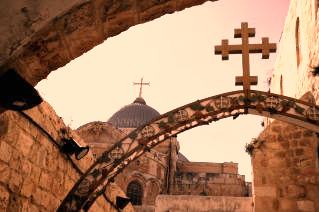
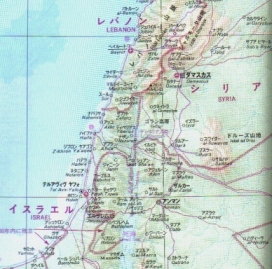
The north where the Palestine district* faced the Mediterranean from the ancient times was the area where Lebanon and Syria placed, and the east was surrounded* by Jordan and the west by Egypt.
Since Israel made a founding* of the country declaration* in 1948 and the first Middle East War (the Palestine war) broke out, Israel has expanded* the territory*. The portion* described in "Israel" in a red character* can be seen among a map.
Jerusalem is now its capital and Bethlehem is immediately* located* to the south. The Dead Sea lies just beside to the east of that city, and it has become in Jordan territory in 2000.
●Back to the Japanese Version Prologue
【 NOTES 】
district―地方/ surround―取り囲む/ founding―創立/ declaration―宣言
expand―拡大する/ territory―領土/ portion―部分/ character―文字
immediately―すぐ接して/ locate―位置する
"With my deepest gratitude* for you, Dr. William Azazu Zakiris"―
This was always the last words in case that youth writes a letter to me.
Albrart al-Hashim. He is one of the famous udo * players now in Paris. No, should he already be called an authority* in Europe?
Albrart. I used to put familiarity* and used to call him like this. It may be more exact* to say that he himself wished so. Now, he is 53 years old. But he is still young-looking and at the time which should just be called the mature stage* of life.
Albrart was once called as "Alrart" from a certain man. Therefore, once there were a time when I was calling him so. But he came to appeal against it that it was a pain.
From a certain time ―Yes, it was a time of his being about 20 years old―but it has already become a long time ago. It has been so since 1962.
Now, I am working as a surgeon* in the new town in Cairo. We sometimes exchanged* handwritten letters occasionally*. After Albrart became busy for his concerts, it became less frequent*.
Today, the Internet is beginning to spread in Arab society. I have also put the personal computer on the house from the convenience* of work. But, it is used to the last* for work.
―Storage* to the file of a patient's chart*, acquisition* of the newest information on medicine. Although I recommended* using a computer also for Albrart, he laughed and denied* to use it with a shake of his head.
That is right... I was foolish. That Albrart would not get used to the life which is going to go to the 21st century.
He has a wild sensitivity. He was born near the desert and grew up there. Near the desert he had grown up untill his boyhood, catching in his whole body that desert fragrant* wind always flows in from the old street in Bethlehem. His music was cherished* in that environment.
Maybe I can assume* that his music could change a lot, develope with the encounter* with "that man" and arrive at the region of completion*.
But why is he in Paris now? ...... I took Albrart to Paris.
He said like this―For he forgets the recollections* of "that man." In order to meet again with the daughter of "that man."
But was it beneficial* to him sure enough?
For Albrart, "that man" was all his lives. The man is not alive any longer now.
Albrart came to Paris, met again with the daughter of "that man", and loved her...... Yet that daughter is not in this world any more, either.
Albrart came to Paris and his dearest son Ali was killed.
Does he determine* to live in that place as his base, entrust* too many thoughts of the past to music, and release* them all to this area?........At least I cannot stop persisting* to consider as for* his immediate stance*.
He is in pain in stopping at the "Arab world" of Cairo. Too many old occurrences* still exist in Cairo for him.
Within his heart ―the load* is too heavy, and it is so also for me to share with him that past. Occasionally, I go to Paris as if I were charmed by the tone of his wonderful performance― qanun * or udo ―but after exchanging short talks with him, I always return to Cairo as if I were an escapee*.
But why did Albrart become a player? What kind of "that man" at all?
Probably, it must be told from the first. The story must go back even to the life of Albrart before 1962.
I may be only a mere* onlooker*. However, I regard* telling the past as required* also for Albrart who still tends to be dragged* in the past with much pain. Albrart will smile calmly and will allow this―
●Back to the Japanese Version Prologue
【 NOTES 】
gratitude―感謝/ udo ―ウード:アラブの伝統的楽器。西洋に伝わりリュートのもとになる/ authority―大家/ familiarity―親しみ/ exact―正確な/ the mature stage―成熟した時期/ surgeon―外科医/ excahnge―交わす/ occasionally―時々/ frequent―頻繁な/ convenience―利便性/ last―
最小限/ storage―保管/ chart―カルテ/ acquisition―獲得/recommend―勧める/ deny―拒む/ fragrant―芳しい/ cherish―大事にする/ assume―推測する/ encounter―(思いがけない)出会い/ region of completion―完成の域/ recollection―記憶/ beneficial―有益な/ determine―決意するentrust―委ねる/ release―解き放つ/persist―固執する/as for―...に関して/ stance―姿勢/ occurrences―出来事/ load―心の重荷
qanun ―カーヌーン: アラブの伝統的楽器。琴のように多くの弦を張ったもの/ escapee―逃亡者/ mere―単なる/ onlooker―傍観者
regard―...と見なす(as...)/ required―必要な/ drag―引きずる
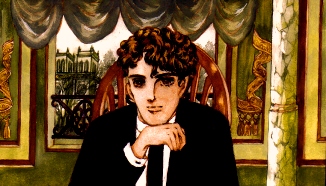
The neighborhood of Saint-Germain is the symbol existence* of Paris. Albrart and I met in a small cafe in the street of San Sevran that faced nearby the Cite island. It was about the beginning on December last year.
Albrart usually takes a rest from the performance on Thursday morning. His favorite cafe is always decided as this "La Seine Canal".
He had already come to the usual window side about the bottom* of this shop when I went in after a delay* of ten minutes although we promised to meet at ten o'clock.
His rather dark skin and long limbs* do not change a bit from the past although he seems to have become a little thin.
He stretched forth* his hands standing from the seat when my appearance was seen just like the time of his being 18 years old when it was our first, faiteful encounter*.
His brightened black eyes remain to be just like his youth―
the eyes always shining with a solitary*, pure shyness.
"Did you wait?"
"No, sir."
No, he should have waited. Still, he never say such a thing. His character has never changed for a lont time.
―As I was taken* the scenery and dimly* looked at them......
Probably he would do such an excuse* and never blame* others.
"I like this scenery as usual. It is not different from former."
"You mean that abbey*?"
"Yes. I like the Notre Dame in the morning. There is a transparent* feeling in light."
"......You has become good at French......"
"Do you think so? I've already been living here for as many as 30 years......"
"Arabic......Do you still remember it?......or forgot?"
"......I've already forgotten it a little......partly."
Albrart averted* the glance* from me as a little having hesitated*. And one letter was importantly taken out of the pocket of his black court.
"I've already read your letter, sir. So I return this to you."
I was surprised for a moment. So far he had never returned my letter.
"In your letter, it was written that you would talk about the past......But, sir, are you willing to make it a note?"
"Oh, never. I'll only write it down. I will show it to nobody."
"......If it will be so, I'm relieved*. Sir, you are an excellent* doctor and also a good poet......So the past might be always rotating* in your mind before you writes it down......and if it is really so, you should not do it......"
"I just wish to record the wheeling* memory......Yes, I only want to write that past cycling in my mind......Can you permit* it, Albrart?"
Albrart became silent for a while, and watched my face.
"There is no right that I can meddle* to say to your doing...... "
He said that and stood from the seat when he drank up coffee.
"Let's already go out. You would hate a long talk."
I walked in silence with him near to the Sorbonne University. On the separation* side, Albrart gave me a firm clasp* of his hand, and floated* the smile in his eyes.
"Can we meet again, Albrart?"
"Yes, sir. At any time, of course. If I am necessary for you......anytime I can always meet you."
And watching my eyes straight, Albrart muttered* in a quiet voice.
"In my mind, the past is also wheeling forever, sir..."
●Back to the Japanese Version Prologue
【 NOTES 】
existence―存在/ bottom―奥(末席)/ delay―遅れ/ limbs―手足
stretch forth―前に伸ばす/ faiteful encounter―運命的出会い
solitary―孤独な/ be taken―気を取られる/ dimly―ぼんやりと
excuse―言い訳/ blame―責める/ abbey―大寺院/ transparent―透明な
avert―目を反らす/ glance―一瞥(べつ)/ hesitate―ためらう
relieved―安心した/ excellent―優れた/ rotate―回転する=wheel
permit―許す/ meddle―干渉する/ separation―別れ
a firm clasp―固い握手/ float―浮かべる/ mutter―呟く
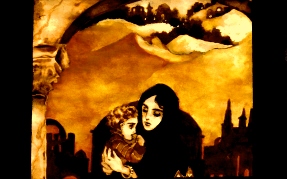
1. "Bashel. Bashel......Do you have a fever?"
It was in the inside of a shack* that was hardened* with mud* and had built there. It was a small place that existed almost in the cave*. Malkart had stored* the water drawn up* from the well* into the sooty* bucket, but she put the towel again in it and squeezed* it by her thin hands.
The outside it was snowing. En Gedi in Bethlehem suburbs* was nearby soon of the Death Sea. The towel hardens as having frozen at once with cold air of the Death Sea. Malkart started blowing* to the towel, and it was warmed a little. Otherwise* the towel was too cold for the sick person.
"Mulart."
In the corner of the hut*, a small boy of about four years old was drawing the picture on the ground with a graphite* picked up somewhere. When he was called by his father, he has sidled up* gladly.
"Yes, Father ?"
"Ah......Receive the towel from Mother and back to here. Touch Father's forehead, my dear."
"......It is hot. It is hot. Do you have a fever?”
"Yeah, right...... When you put the towel on my forehead, it is pleasant. Please do it."
Mulart received the towel from his mother, and put it to his father's forehead quietly.
"......You are a good child......Good job."
"Father, are you sick? Why? Let’s call a doctor."
"......There's no doctor at all."
"Why?"
"Bad......bad people had come......and all the doctors were taken away......"
"Where? Why?......Then, Father......Are you dying?"
"......Maybe it will be so......"
【 NOTES 】
shack―掘っ立て小屋/ harden―固める/ mud―泥/ cave―洞窟
store―蓄える/ draw up―汲み上げる/ well―井戸/ sooty―すすけた
squeeze―絞る/ suburbs―郊外/ blow―息を吹きかける
otherwise―さもないと/ hut―小屋/ graphite―石墨/ sidled up―にじり寄る
2. The infant was speechless with a look of surprise. "Death" cannot be understood for him. However, he seemed to have a kind of sad feelings. His big, pretty eyes were filled with tears, and he watched Bashel. The ud and qanun that Bashel had been valuing* were put at the bedside of a coarse* bed where he was lying.
For this young poor family of Palestinian, these musical instruments* were the treasures. The other things were just three plates of the copper* chipped* and distorted*, two glasses cracked*, one bucket, and a thin, dirty blanket for the mother and the little boy to muffle* themselves up and sleep together.
"Mulart......Be a dear. Now don’t cry......Look at my bedside."
"What......What is this?"
Mulart touched the glossy*, shining qanun . So many bowstrings* that shone brilliantly* were stretched over that. It was the first time for Albrart to touch the musical instruments.
"......It is called qanun ......A beautiful sound is emitted*. Try to play something......Put the bowstring quietly with your finger, my dear."
Mulart silently patted* the bowstring as he was said. The glittering* tone sounded extensively* in a dim* cave. Mulart became glad and began to pluck* the strings freely one after another. The performance was gradually made into a beautiful shape as if it recalled* a vast* wind of the desert.
【 NOTES 】
value―大事にする/ coarse―粗末な/ musical instruments―楽器
copper―銅/ chip―削る/ distort―歪める/ crack―ひびが入る
muffle up―くるむ/ glossy―光沢のある/ bowstring―弦
brilliantly―鮮やかに・きらきらと輝いて/ emit―音を放つ/ pat―撫でる
glitter―光輝く/ extensively―広く/ dim―薄暗い/ pluck―弦をかき鳴らす/ recall―思い出させる/ vast―広漠とした
3. "Look at him, Malkart......That is exactly* what I’ve said..."
"Oh, what are you saying―?"
"Our son......Albrart has a talent...He inherits* your
talent of dancing...and surely he can be a splendid* musician......"
"Bashel! But it is absolutely* impossible even if he can be so...The Israeli troops* are already approaching around......
They are sure to drive* us out or to accommodate* us in the refugee* camp......It’s already the matter of time.
I feel rather painful that child has a musical talent......
I cannot have the future dream of our son becoming a splendid musician...... We cannot see how long the occupation* of Israeli troops will continue. It might last* for our lifetimes*......!"
The Jew who was the wanderers* until recently accomplished* the dream of found*ing their own country Israel in Palestine in 1945. However, Palestinians who had lived there for a long time became the wanderers in turn oppositely*.
The rumor* of "Palestinian mopping-up* operation*" by Israeli troops has spread* with fear between scattering* Palestinians. Especially, the word "Refugee Camp" was the greatest fear for them.
The young couple started happy life in 1940 by a small apartment living in Bethlehem. Then they were given a lovely boy two years later. The couple named the baby "Albrart". Bashel al- Hashim was 25 years old at that time, and after having graduated from Academy of Music in Bethlehem by an excellent record*, he started the music activity as a player of ud and qanun .
Malkart el-Alawi was Romany (Gypsy) and Armenian's mixed blood. The vagrant* life was continued as the Romany, and at last they traveled to reach Bethlehem. Although she was still six years old then, her dance was excellently wonderful as she had inherited the talent of Romany.
The dancer's rumor gradually spread to the town in Bethlehem, and Malkart took her own stage in the theater in the town at the age of 15. She fell into love with Bashel who was the accompanist* of her stage one year later. The lovers held the wedding that followed* the tradition of Palestine in 1940. The bride was still 17 years old.
However, who could predict* that the life of anxiety*, fear, and death would start for them Palestinians as soon as the World War II ended in five years―?
【 NOTES 】
exactly―まさに/ inherit―受け継ぐ/ splendid―見事な/ absolutely―決定的に/ troops―軍隊/ drive―追いやる/ accommodate―収容する
refugee camp―難民キャンプ/ occupation―占領/ last―続く/ lifetimes―生涯/ accomplish―願望を成し遂げる/ found―創立・建国する/ oppositely
―逆に/ rumor―噂/ mopping-up―掃討/ operation―軍事作戦/ spread―広まる/ scatter―散り散りになる/ record―成績/ vagrant―さすらいの
accompanist―伴奏者/ follow―慣習にならう/ predict―予測する/ anxiety―不安
●Back to the Japanese Version Part 1
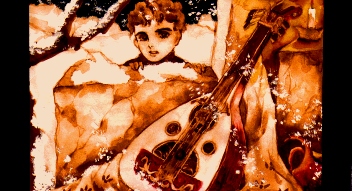
1. Ein Gedi was hit by a hard blizzard* until the beginning of 1947 from last few days of 1946. When Albrart went out from the hut, the ground was deeply covered with snow which was so thick up to around his waist. He covered his small body with the frayed* blanket, and filled his mouth hard with the snow which was scooped* up by his benumbed* hands. After a while, the snow begins to melt* in his mouth. Then he nibbles* at a little biscuit left in the hut―that was only his meal on the day and it was soon over.
When January came, Bashel hardly spoke anything. He doesn’t move as having frozen in the dirty bed with a rough* breathing. Malkart sat down by her sick husband and rubbing* his cold hands and feet as if she forgot her small son.
On a day when it cleared up unusually, the piling* snow on the hut began to melt gradually*. The melting snow flooded* in the hut―in the cave. A white snow still remained by the musical instruments put on the sick man’s bedside. Albrart nestled up* his mother for asking her the biscuit. It was still the wilderness of the snow blanket outside of the hut.
Malkart wore the shawl from the head, and was watching Bashel as biting* her lips. Bashel did not move utterly*. His eyes were just shut and his complexion* was quite pallid*.
"Say, Mother. It's cold."
"......"
"Say, embrace* me more closely."
The mother embraced the infant closely with a jerk*, but she felt as if she lost her strength*.
"Say, what’s the matter with Father? Is he asleep?"
"......Yes."
"Is he dead?"
"......Yes."
"Won’t you bury* him under the grave*?”
"......Yes......"
Albrart dragged* the ud and qanun which was put on his father's bedside to the outside of the hut. With his wearing blanket, he wiped* and polished* politely* the parts of the instruments wet with the melted snow―as if his father revived by this doing.
He sat down in the snow and quietly plucked and sounded the bowstring of qanun by his benumbed hand. The sound extended as shining in the snowfield that glittered* in the morning sun, echoed* on the frozen Dead Sea, and flowed* to the distance far, far away. Albrart felt that sound reached to the place where his dead father was.
【 NOTES 】
blizzardー猛吹雪/ fray―擦り切れる/ scoop―かき集める/ benumbed―かじかんだ・寒さで麻痺した/ nibble―少しずつかじる/ roug―荒い/ rub―こする/ pile―積み重なる・降り積る/ gradually―徐々に/ flood―水浸しにする・溢れる/ nestle up―体をすり寄せる/ bite one's lips―唇を噛み感情を抑える/ utterly―まったく/ complexion―顔色/ pallid―蒼白い(=pale) / embrace―抱きしめる/ with a jerk―急にぐっと/ strength―力/ bury―埋葬する/ grave―墓/ drag―引きずる/ wipe―拭き取る/ polish―磨く/ politely―丁寧に/ revive―蘇生する/ glitter―キラキラ輝く/ echo―(音が)こだまする/ flow―流れる
2. When entering the hut, his mother watched his father’s pale face without shedding* tears. Malkart sprinkled* the snow on his father’s body like unconsciously* doing. The body of Bashel was covered with the snow by coming to most leaving the face. Seeing that his mother was still covering even the dead’s face with the snow, Albrart ran up to her panicking*.
"Father......!"
At this moment, tears were rising to the eyes of the child who had lost his father for the first time. The endured* sob* could not be stopped any longer. Albrart cried raising his voice as he clung* on Bashel’s dead face. The father was still young, and his quiet expression* was godlike solemn*.
Malkart picked up a thin tree branch from somewhere around there, and she quietly stabbed* it on the grave that had been hardened by the snow. When it became a night, the grave post* shook waveringly* quietly with the flap* of the wind.
―After that, when he became about 28 years old, Albrart visited Ein Gedi where he had lived with his parents for the first time after an interval* of 24 years. That was around the time after the third Middle East war had ended, and the vicinity* had been ruined*. Of course, the mark of the hut and father's grave were not able to be found.
"Now let’s go."
The track driver who had been guided him from Jordan said. Albrart was crouching* down around the place where the hut had been and watching silently the Dead Sea which shone in the east. The smell of the salt has drifted from the beach.
"It is dangerous. This is occupied area of Israel around here. Recently they attack even us cruelly*. Even more, my master*, you are―"
"I understand."
Albrart stood up and look around the driver.
"I'm sorry. We are risking our lives around here......"
"No, it's me who apologize* to you. Let's already return."
The track which put them cut out* and began to run. From the passenger's seat, Albrart looked Ein Gedi over his shoulder which went away fast. He had never stepped on this place any more―
About three days after Bashel’s death, the food taken out from the apartment in Bethlehem were beginning to be clean out. After having shared the last biscuit with Albrart who had just become five years old, Malkart muffled* herself and her son up with ragged* blanket and was crouching outside the hut.
The hut had become frozen with the snow as it had been made from mud. So gradually it had melted, laid flat, and at last collapsed*. She could not quite see what to do hereafter*. Tracks and jeeps sometimes passed in front of them.
【 NOTES 】
shed―涙を流す/ sprinkle―振りかける/ unconsciously―無意識に/ panick―慌てる/ endured―我慢していた/ sob―すすり泣き/ clung (cling)―しがみついた/ exression―表情/ solemn―厳かな/ stab―差し込む
grave post―墓標/ waveringly―揺れながら/ flap―(風の)はためき
interval―(時の)隔たり/ vicinity―周辺/ ruin―破壊する/ crouch―かがみこむ/ cruelly―残酷に/ my master―旦那様
apologize―謝る/ cut out―スピードを上げる/ muffle―(体を)包む ragged―ボロボロの/ collapse―崩壊する/ hereafter―今後
3. Then Malkart noticed that someone was grasping her hand. She was going to sleep by the cold and hunger. She brushed* the hand off in surprise and looked who it was―there was a woman in her thirties who seemed to be a nurse, and she also gazed* at Malkart surprisingly.
"What in the world―how long have you been here?"
She could speak Arabic fluently*, but Malkart answered nothing.
"Please come with us. Otherwise you will die as it is."
"Where......?"
"To the refugee camp that is in Qumran."
Malkart came to be frightened hearing the word "refugee camp," as she remembered what Bashel had said before they went out from the apartment in Bethlehem.
"Bethlehem will be surely occupied by Israel in the near future. We must run away before their capture*. I’m afraid the place we run away would be safe everlastingly*―
If it is not possible to live there, we have to live in some refugee camp......But the life in the camp is next door to danger. We cannot predict when Israeli troops will attack the camp......"
Malkart thrusted* the nurse aside and muttered* weakly.
"No......I don’t want to go to the camp."
The nurse eyed her in surprise because of her saying. Malkart was still young, beautiful. Though being emaciated*, she has a glossy* skin, and her brilliant* black eyes looks like the large flower. Nearby, there is still a small boy, too.
"Oh dear, no worry about anything. Please relieve*. The camp has just been built with the help of the International Red Cross......Well, the sanitary* conditions......can never be said good, but it would be rather helpful for you than you are sitting down with this lovely, little boy for a long time. From now, you Palestinians have to help each other and live with them and survive* together......The camp will be your town hereafter. Now please take the jeep―"
However, Malkart did not have the power only of walking to take the car. Albrart was also similar*. At last, they were taken to the car with the nurse by the help of the driver of the jeep. A back seat of the jeep was warm.
The nurse made the young mother and the child drink a warm milk, and she made them laid on her knee. They were completely malnourished*. It took about two hours to Qumran. The mother and child embraced each other, and slept on the nurse’s knee.
However, Albrart remembered it as the last memory of his early childhood for a long time that the musical instruments of his father’s relic* was put beside him as importantly as his mother at that time.
【 NOTES 】
brush off―払いのける/ gaze at―じっと見つめる/ fluently―流暢に capture―占領/ everlastingly―永遠に/ thrust aside―押しのける /mutter―つぶやく/ emaciated―痩せ衰えた/ glossy―つやのある brilliant―華やかな/ relieve―安心させる/ sanitary―衛生的な /survive―生き延びる/ similar―同様の/ malnourished―栄養失調の/ relic―遺品
●Back to the Japanese Version Part 1

1. "Look at the blackboard, children."
Albrart came round* by Tawfik's voice. The field cultivated* has extended besides a small wooden classroom. Here and there, the white blossoms which has become light green has been already blooming on the planted olive trees. Albrart lost in ecstasy by a faint, fragrant scent*.
"These are the English alphabets. Mulart. Don’t look at the outside. Pronounce* them for a moment."
Albrart stood up timidly* and saw the blackboard. Some unfamiliar characters* are written there. He learnt the basis of Arabic script* last year. At first, he felt freshness in the mother tongue, and he studied it ardently*. However, English must be learnt this time. He felt he was poor at foreign language.
"Come on. You didn’t listen to me, did you?"
"I’m sorry."
"Then, just do it again. Pronounce only A, B, C, D, and E."
Albrart tried to mimic* the teacher’s pronunciation sometimes stumbling*. He couldn’t feel that he could pronounce well. About ten children who gathered in the classroom snickered* or whispered* each other.
Tawfik made the children the five alphabets write on their
lithographs*. Because there were neither pens nor inks, they used the stones sharpened instead of pencils.
Tawfik made the blackboard by himself. When founding a school, he was given one plywood*, and he painted it black. There was not chalks either. He wrote on the blackboard with the sharpened stones as well as children.
Albrart has come to live in the refugee camp, and about three years have already passed. There were neither a school nor a hospital in the camp at first. The preparation* for building such facilities* was advanced* by the help of the United Nations though everyone pitched* the tents and lived within them.
The youth named Tawfik went to the teacher training school in the town of Ramura. He took an infant daughter because the Palestinian persecution* of Israeli troop became violent, and he had escaped in this camp. He worried about the children of the camp hardly receiving any education, so he decided to "establish* a school."
At first, the adults in the camp were absorbed* in securing* foods and changing the moor* into the farmland, and a lot of children were suffered from malnutrition*, so they could not afford* to study at school.
【 NOTES 】
come round―我に返る/ fragrant scent―芳しい香り/ pronounce―発音する/ timidly―おずおずと/ character―文字/ script―書体/ ardently―熱心に/ mimic―口真似する/ stumble―つまずく/ snicker―忍び笑う
/whisper―ひそひそ話す/ lithograph―石版/ plywood―ベニヤ板 /preparation―準備/ facilities―設備/ advance―進める/ pitch―テントを張る/ persecution―迫害/ establish―創設する/ absorb―熱中させる /secure―確保する/ moor―荒地/ malnutrition―栄養失調
/cannot afford―(~する)余裕がない
2. Albrart was already eight years old. Even if it was possible to establish such facilities as school or hospital, it did not seem to be buildings. Both were the superficial* ones which were built with wood or hardened mud.
In the camp, Albrart could make some friends who were at about the same age. Still, they could not be able to spend the cold winter of last year, and the children who died at six or seven years old were endless. The hygienic* condition was also bad, the epidemic* went around, and the person who did not have physical* strength went over* one after another.
The United Nations and the Red Cross Society have carried the medical equipments* to the hospital. Because Albrart and his mother Malkart had fallen at high temperature* last winter, they were put on drips* for about a month in the hospital. His mother was still in the hospital. Just when they reached the camp, they had no immunity* to any diseases* for the awful* living in Ein Gedi over two years.
"Mulart. Come here just for a moment."
When the class in the morning was over, Tawfik called the boy to his side. They sat down on the wooden floor because there were no chairs in the classroom.
Albrart has become clean-limbed* recently*. His features* has come to resemble* his mother well, and being a boy, he has a glamourous air*. Among the children who were at about the same age as him, he was the tallest.
"What? Teacher."
"Ah...... it's what I've been feeling previously*......Do you hate studying?"
"What? What does studying mean......?"
"I mean English."
The boy looked down as being embarrassed*.
"You say about English......But we don't need to remember it, do we?"
"Why do you think so?"
"Because......there's no necessity to talk with Americans."
"Surely you have no need now. But it'll be necessary for you when you grow up."
"Well, I see."
Albrart's small face blushed* for a moment, and he looked up at the youth.
"You know, Teacher. I......I don’t really like studying."
"Oh yeah, I don’t care. You will come to like it sooner or later."
The way to teach of this young teacher was always the same.
It is not compulsory*, and he waits that children's interests spring naturally. Therefore, children were able to tell Tawfik anything at ease.
"I'm sorry, Teacher......but it was the first time for me to study last year. It was interesting last year. But I cannot remember even English......fully."
"No, it is not so. You like to play ud and qanun rather than studying. I understand it well."
"Yes, you are right. But Teacher, come here for a moment."
【 NOTES 】
superficial―見かけだけの / hygienic―衛生的な/ epidemic―伝染病
physical―体の(~strength=体力) / go over―倒れる/ equipments―設備/ at high temperature―高熱で / be put on drips―点滴を受ける
immunity―免疫 / disease―病気 / awful―怖ろしくひどい
clean-limbed―手足がすらりとした/ recently―最近/ feature―顔立ち
resemble―似ている/ glamourous air―雰囲気 / previously―以前
embarrassed―当惑して/ blush―赤面する/ compulsory―強制的な
3. Albrart began to run aiming on the top of low hill when going out of the classroom. There was a graveyard* of people who had died at the camp. Albrart was on the most north sides in graveyards when Tawfik caught up with the boy at last.
"Here. Hey, come on......Teacher......look at these.”
There were graves of the friends of Albrart. Only Albrart survived though they had been hospitalized* together last year.
"I can already read and write......Look, this is the grave of Taric―Taric Al Jamil-and that is the grave of Ali―Ali el Azaz―
You see, it is already possible for me to read. I wrote those names on ground many times, and I practiced and practiced. So I can already write the characters of their names."
Oh how poor this young child is―yearning for* his dying friend, going out every day to the graveyard, looking at their grave posts, seeing the engraved* letters, and practicing of reading and writing......
But there are neither textbooks nor reading books―The school is merely nominal*.
Tawfik thought that it couldn’t be helped. Children can do nothing but acquire* only the basis of reading and writing of their mother tongue*, and after that, there was just the way for them to study their language by their own method*.
"Well......Did you imitate* the names of other people?"
"Yes. Therefore, I can at least read and write just the
people’s names."
"Then, you don’t hate the study, do you, Mulart?"
"Well, I can’t see. Maybe I hate it or like it."
Two people went down the hill together. The boy was walking barefooted*. He had never put on his shoes ever since he could remember. In cold winter, being barefooted was awfully* painful for the little boy. However, it is an early summer now―June has just come. Walking barefooted was fresh and comfortable for him.
Out of nowhere a fragrant wind blew with the smell of the olive flower. Albrart stretched himself, spread his arms wide, and inhaled* the wind into a full chest.
......It’s the desert’s wind......the wind of the Judah desert......
"Teacher. May I go to your tent tonight, too?"
"Of course. Please come before beint too much dark."
"Are there musical instruments at the usual spot?"
"Yes, at the corner of the tent. Aysha always polishes them."
"Oh it’s reallly? Great! A good sound is not emitted if dust
gathers in the bowstring."
Tawfik put his hand on the boy’s shoulder.
"Please play something and make my daughter hear them this evening also."
【 NOTES 】
graveyard―墓地/ hospitalize―入院させる/ yearn for―(~を)慕う
nominal―名ばかりの/ acquire―習得する/ mother tongue―母国語
method―方法/ imitate―手本にする/ barefooted―裸足で
awfully―怖ろしいほどひどく/ inhale―吸い込む
●Jump to the next page of Chapter 3
●Back to the Japanese Version Part 1
ジャンル別一覧
人気のクチコミテーマ
-
-
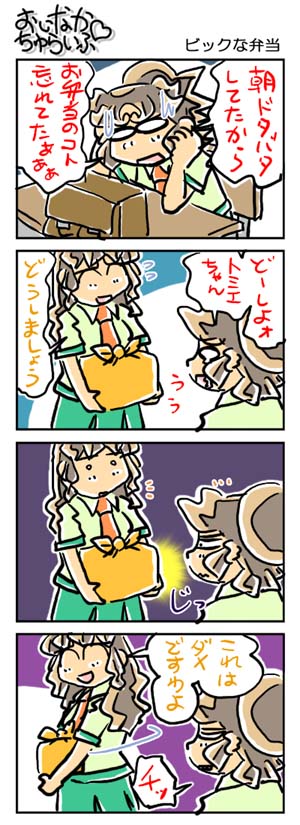
- イラスト付で日記を書こう!
- 一日一枚絵(11月14日分)
- (2024-11-27 23:49:17)
-
-
-

- アニメ!!
- 【中古】 幻魔大戦(Blu-ray…
- (2024-11-14 14:54:38)
-
-
-

- この秋読んだイチオシ本・漫画
- 【中古】奪う者 奪われる者 <1−10…
- (2024-11-27 13:54:27)
-
© Rakuten Group, Inc.



